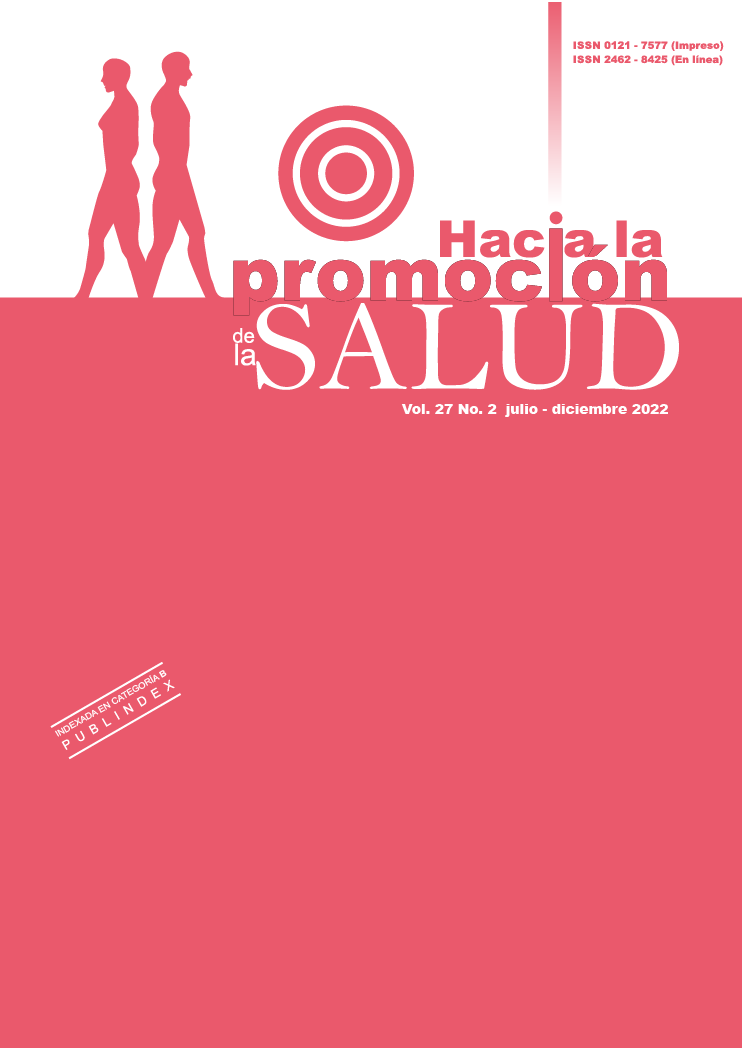Authors
Abstract
Objective: to present the learning of a systematization as a method, for the construction of knowledge based on the experience lived by the researchers of several projects on parenting education in the field of public health carried out in the rural settlement of Granizal, Antioquia, during the period 2013-2019. Materials and method: the systematization of experiences was used and the participants were the researchers. It began with the organization of the materials, the field diaries of the thematic research circles and reports of the meetings of the research team and community actors. It was continued with the elaboration of a matrix with the historical recovery. And, finally, reflections, categories and relationships emerged from the group for the theoretical construction of the overall vision. Results: the theoretical proposal of the systematization and the procedures to implement it are presented, guided by five moments: living the experience, formulating a systematization plan, recovering the lived process, the background reflections and the arrival points. Four features of systematization stand out: creative research; research based on a process of collective construction; learning from practice and building knowledge; and as a transforming scenario of this research and of those who carried it out. Conclusion: the “systematization of the systematization” allowed raising awareness of the research praxis itself. It shows the understanding of the group on conceptualization and methodology of this research perspective. It transcends the collection and organization of the information of the process lived to the extent that the reconstruction of the experience is a broader understanding that transforms the practice of the subjects involved.
References
Mejía M. La sistematización como proceso investigativo. O la búsqueda de la episteme de las prácticas. Bogotá: Centro
Internacional de Educación y Desarrollo Humano (Cinde); 2007.
Jara O. La sistematización de experiencias: práctica y teoría para otros mundos posibles. Bogotá: Centro Internacional de
Educación y Desarrollo Humano (Cinde); 2018.
Jara O. La sistematización de experiencias: aspectos teóricos y metodológicos. Decisio [Internet]. 2010; 1:1-8. Disponible
en: https://bit.ly/3kMsPjC
Torres-Carrillo A, Cendales-González L. La sistematización como práctica formativa e investigativa. Pedagogía y Saberes.
2007; (26):41-50.
Ministerio de Salud y Protección Social. Resolución 8430 de 1993. [Internet]. Bogotá: Minsalud.; 1993 [Citado 10 abr.
2021]. Disponible en: https://bit.ly/3FrC28Z
Asociación Médica Mundial. Declaración de Helsinki: principios éticos para la investigación médica sobre sujetos
humanos. [Internet]. México: 2002 [Citado 10 abr. 2021]. Disponible en: https://bit.ly/3CrkAiY
Centro de Estudios Para la Educación Popular (CEPEP). La Sistematización de Experiencias: un método para impulsar
procesos emancipadores. Caracas: Sistema Nacional de Imprentas; 2010.
Mejía MR. La sistematización. Empodera, y construye saber y conocimiento sobre la práctica desde la propuesta para
sistematizar la experiencia de Habilidades para la vida. Quito, Ecuador: Fe y Alegría; 2015.
Torres A, Mendoza N. La sistematización de experiencias. Presupuestos epistemológicos y procesos metodológicos.
En: Aldana G, Mora E, editores. El quehacer investigativo: enseñanza, modalidades, presupuestos y evaluación de la
investigación. Bogotá: Fundación Universitaria del Área Andina; 2012. p. 99-139.
Ghiso A. Sistematización. Un pensar el hacer, que se resiste a perder su autonomía. Decisio [Internet]. 2011; 28:1-6.
Disponible en: https://bit.ly/3oGNtCP
Freire P. La educación como práctica de la libertad. México: Editorial siglo XXI; 1979.
Fals-Borda O. Orígenes universales y retos actuales de la IAP (investigación acción participativa). Análisis Político
[Internet]. 1999; 38:71-88. Disponible en: https://bit.ly/3Ducqro
Reason P, Bradbury H. Introduction: Inquiry and participation in search of a world worthy of human aspiration. In: Reason
P, Bradbury H (Eds). Handbook of action research. Londres, UK: Sage; 2001. p. 1-14.
Bosco- Pinto J. Secuencia metodológica de la Investigación-Acción. Manizales: Universidad de Caldas; 1987.
Mariño G. Una propuesta didáctica para operacionalizar el diálogo cultural. Aportes. 2000; 53: 20-55.
Peñaranda F, López JM, Molina DP. La educación para la salud en la salud pública: un análisis pedagógico. Hacia Promoc.
Salud [Internet]. 2017; 22(1):123-133. Disponible en: https://bit.ly/3HwPBG3
Hatton N, Smith D. Reflections in teacher education: Towards definition and implementation. Teaching & Teacher
Education. 1995; 11(1):33-49. doi: https://doi.org/10.1016/0742-051X(94)00012-U
Strauss A, Corbin J. Bases de la investigación cualitativa: técnicas y procedimientos para desarrollar la teoría fundada.
Medellín: Editorial Universidad de Antioquía; 2002.
Ruiz G. La teoría de la experiencia de John Dewey: significación histórica y vigencia en el debate teórico contemporáneo.
Foro de Educación. 2013; 11(15):103-124. doi: http://dx.doi.org/10.14516/fde.2013.011.015.005
Nussbaum M. Sin fines de lucro. Por qué la democracia necesita de las humanidades. Madrid: Katz Editores; 2010.
Feyerabend P. Contra el método: esquema de una teoría anarquista del conocimiento. 2 ed. Barcelona: Editorial Ariel;
1989.
Lyotard JF. La condición postmoderna: informe sobre el saber. Madrid: Cátedra; 2006.
Denzin N, Lincoln Y. Introduction. The discipline and practice of qualitative research. In: Denzin N, Lincoln Y, editors.
Handbook of qualitative research. Thousand Oaks, CA: Sage; 2000. p. 1-27.
Stenhouse L. Artistry and teaching: The teacher as focus of research and development. Journal of Curriculum and
Supervisión. 1988; 4(1):43-51.
Gadamer H. Verdad y método. Salamanca: Sígueme; 2006.
Schon D. The reflective practitioner: How professionals think in action. New York: Basic Books; 1983.
Habermas J. Teoría de la acción comunicativa. Madrid: Taurus; 1987.


 PDF (Español)
PDF (Español)
 FLIP
FLIP



























